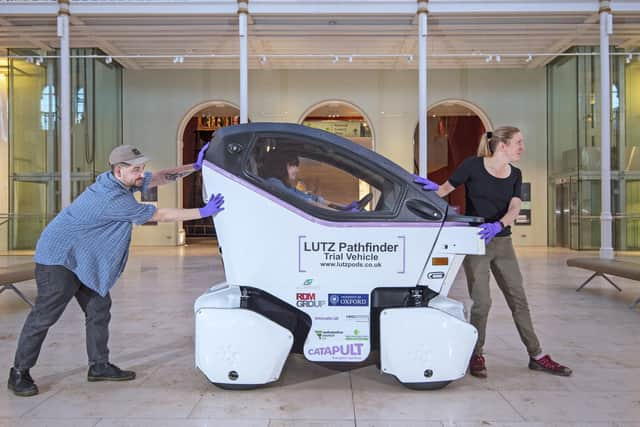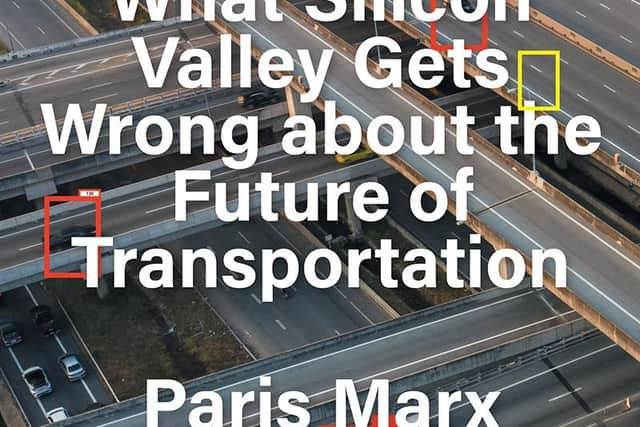Book review: Road to Nowhere – Silicon Valley and the Future of Mobility, by Paris Marx
If you want a nightmarish vision of the direction in which technology is taking transport, Paris Marx has painted just that chilling picture. Road to Nowhere sets out how autonomous vehicles and electric scooters are making a new assault on the rights of pedestrians, a century after the rise of the car pushed walkers off roads, with pavements becoming the new battleground.
For all the freedom and convenience afforded by cars, Marx underlines the extraordinary toll exacted by motor vehicles – an estimated 1.3 million people every year, or an extraordinary 3,500 a day. I wasn’t aware that in the early decades of the car in the US, victims’ families didn’t take this lying down. Marx writes that the scale of casualties “became a sensation that may be difficult to comprehend by looking back with present day values”. In the 1920s, he says, demands for action against child road deaths saw posters depicting the car as a “modern Moloch” [pagan god of child sacrifice] along with funeral parades, public ceremonies and memorial landmarks.
Advertisement
Hide AdAs Marx observes, such a reaction came because mass road fatalities had yet to be normalised: “Today, if a pedestrian dies when venturing onto the street, people often respond by questioning why they had been there in the first place.”


The author also charts the familiar story of car domination leading to vast urban sprawl generated by highway expansion, but I was surprised to read that some US states are still following the same failed policy of attempting to ease congestion by spending billions of dollars on more roads, such as in Texas and even California.
However, some of the more recent developments in America are even more disturbing. Among them are robotic delivery vehicles and rental e-scooters blocking pavements, and while these haven’t yet materialised on Scotland’s streets, I remember how shocked I was to hear an automated marketing phone call for the first time while staying in a US apartment 20 years ago, only for the scourge to become commonplace here soon afterwards.
Marx’s core argument is that in a similar way to the spread of automobiles 100 years ago, tech firms like Uber and evangelists like the “over-promising and under-delivering” Elon Musk of Tesla are essentially just in it for the money and personal whims – such as Musk’s tunnel plans to make it easier for him to get from A to B – rather than improving mobility for all.
Marx says such innovations are benefiting only a narrow band of society while making things worse for the rest through the threats they pose to public transport, workers’ rights and the environment. While cars have already taken over the roads, he says e-scooters and delivery robots now threaten to dominate the pavement.


At least for now, the former are banned from pavement use in the UK, but how long before a similar incident happens here to that related by Marx, in which a wheelchair user in Pittsburgh found herself alarmingly stranded in the road because the dropped kerb at a crossing was blocked by a stationary robot as she tried to reach the opposite pavement.
Advertisement
Hide AdMarx is equally scathing about self-driving cars, if somewhat didactic, declaring that, 60 years on from predictions that such technology would become normal, “we still do not have to live with any such thing", going on to even describe them as “illusive”. However, along with his dystopian fears over tech firms’ attempts to take over mobility, Marx points to one glimmer of hope – the positive dividend of soaring oil prices in the 1970s, which we are facing again.
Although moves to reduce energy consumption back then were short lived in the US, Marks points out how, in the Netherlands, cycling was promoted with dedicated lanes and redesigned streets to reduce vehicle speeds. Marx wrote this book before the current cost of living crisis, but such references come as timely pointers that low-tech transport like walking and cycling could benefit us all, regardless of whether you buy into his prediction that we are on a “road to nowhere”.
Road to Nowhere – Silicon Valley and the Future of Mobility, by Paris Marx, Verso, 272pp, £14.99
Comments
Want to join the conversation? Please or to comment on this article.